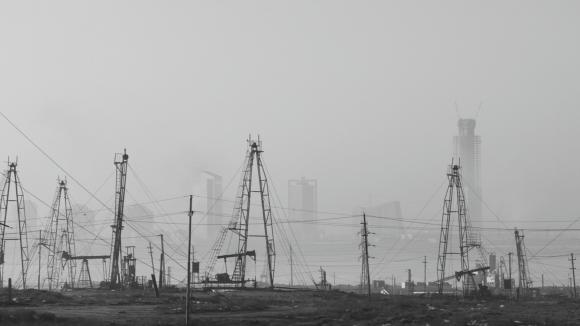Eccentric activism in the “Spoon”

“Spoon” (Latvia, Norway, Lithuania), the eleventh feature film by Laila Pakalnina, who has created over 30 films in thirty years - no less, no more - is yet another not surprising but also not disappointing combination of her distinctive creative style and worldview. Whether it’s a documentary or a narrative film, all films by the director are united by an ironic look at life, its daily absurdities, small and large. In the minimalist film “Spoon”, the life of a piece of plastic ends as soon as its existence starts to become meaningful.
The world heard about the today’s undoubtedly most famous Latvian director when her trilogy “The Linen” (Vela, 1991, VGIK thesis film), “The Ferry” (Prāmis, 1994) and “The Mail” (Pasts, 1995) was awarded FIPRESCI prize at the Cannes Film Festival’s Un Certain Regard program. Today Pakalnina is the most famous and most active Latvian filmmaker whose films are screened at the Cannes, Venice and Berlin festivals, and last summer her retrospective was shown at the Pompidou Center in Paris entitled “Laila Pakalnina, drôle de réel” (in French – “funny reality” or “ridiculousness of reality”). This title perfectly describes the director’s style of filmmaking and her relation to the world. She uses irony even when she speaks on today’s highly sensitive topics of ecology and consumerism.
The main idea and humour of the film come from the contrasts. “Spoon” is a treatise on the role of disposable items in modern culture and economy. There is a paradoxically high amount of investment in the production of insignificant items which are used only once – for someone in a park to eat from their lunch box, a single plastic spoon goes through a chain of actions of incredible length and complexity that spans half the globe. The phenomenon itself is asking for some critical thought. Laila Pakalnina, who has cherished a peculiar humorous look at the world around us for decades, is probably the best person to document this chain of processes. Emphasizing the contrasting proportions – the long production process and transience of the result, the gigantic factory and miniature human figures that assist in it – Pakalnina speaks not only about the consumerism of humankind but also of the greatness of its creations and global processes that it controls. The filmmaking process and the result of the film are also based on contrast. The journey of thousands of miles from Europe to the plastic factory in China (by the way, it took 9 months to obtain a permit to film there) that was travelled by Pakalnina and her crew turned into a minimalist film that subtly ironizes the nowadays. The film has become a perfect example of her auteur fortitude. Whether she makes a dense, intertextual historical opus like “Dawn”, or a conceptually ingenious yet minimalist in content documentary, she seeks just one thing – to showcase how clippings of everyday life, if we take a closer look, speak to us about the world in a different way.
The work of Pakalnina and her long-time creative partner, Gints Berzinis, originates from the Baltic tradition of poetic documentary filmmaking, where literary narrative is pushed to the background by pure cinematic language, where meanings are created by the composition and depth of shots, the rhythm of editing, light and displacement of colour from the image to show metaphoricity of the movements or objects that caught the director’s eye.
The first shot of the film, and at the same time its first scene, encodes the visual and musical tone – static camera captures the monumental interior of some factory where depersonalized human figures move, and the action is accompanied by industrial music reminiscent of the sounds of factory machinery (composer Malika Makouf Rasmussen). It is followed by the film’s only line, Leonardo da Vinci’s phrase “everything here is related to everything”, which is reflected in the globality of oil and plastic products and their absurd odyssey from one end of the world to the other and back. The whole film is made up of static shots following the path of the plastic, from Norwegian oilfields to the factory of disposable utensils in China, and finally to a waste container, where the plastic spoon that was used just for a short moment ends up. Longer or shorter shots are connected by various motifs of movement – of people, machines, or just things moved by the wind. Namely the movement that often comically messes up the aestheticized peacefulness of industrial backdrop, becomes a stimulus to think about what the director means behind the pictures lacking in straightforward narrative.
After studying at VGIK (Gerasimov Institute of Cinematography in Moscow), Laila Pakalnina worked for a long time as a columnist in a Latvian newspaper. Perhaps this is the source of her impulse to observe daily life, to share her subjective glance at things that at first seem unnoticeable, insignificant, and to create a reflective work of this, that allows us to see the meanings invisible to the naked eye. In one interview, Laila Pakalnina explains the simple themes of the films by the fact that at the beginnings of the cinema, its inventors, the Lumière brothers, turned their cameras on the simplest of things: workers leaving the factory or arrival of a train at a station. Those films, though old, look interesting, because despite all the outside changes, life is still as simple as it was earlier. Like the Lumières, after turning on the camera, Pakalnina waits for the life to “happen” in the frame, and then she will share this seemingly unremarkable event with others.
The spoon is slowly becoming the metaphor for our excessive, ever-expanding civilization – a piece of cheap plastic that will soon disappear in the folds of world history. The film ends with a shot of the oil pumpjack swinging monotonously – the director makes the final warm ironic point about the modern world, full of absurdity.